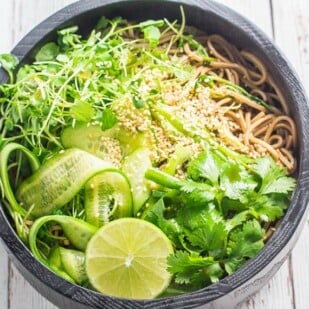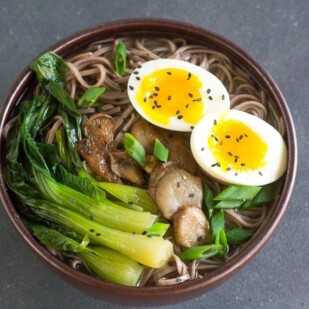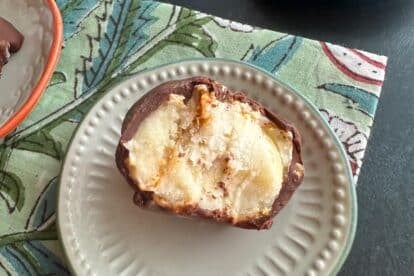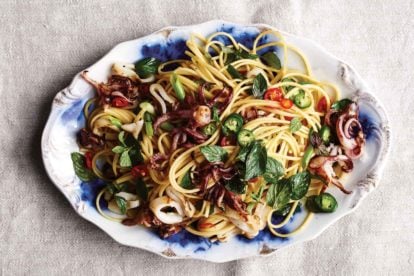Cold soba soup is a traditional soup and this Low FODMAP Cold Soba Soup is our LOFO take on it. We love this on a hot summer’s night, but it works beautifully for lunch as well. Even though soba are made from wheat flour and buckwheat flour, they have been lab tested and have a low FODMAP serving size, which is detailed in our article All About Asian Noodles & FODMAPs, which we suggest that you read.
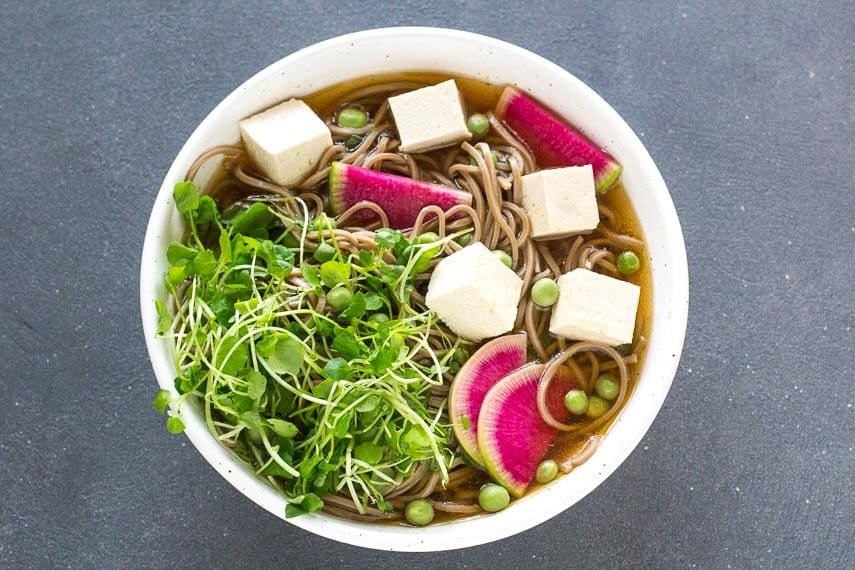
Watercress Is Low FODMAP
There are many vegetables – even leafy green vegetables – that have low FODMAP serving sizes and while watercress is one of them, we realized we hadn’t use it much in our recipes. This recipe for Low FODMAP Cold Soba Soup uses it to great effect along with daikon radish (more on that in a moment).
Monash has lab tested watercress and it is low FODMAP in portions of 1 cup (80 g). No Moderate or High FODMAP levels are given. Individual tolerance, as always, can vary.
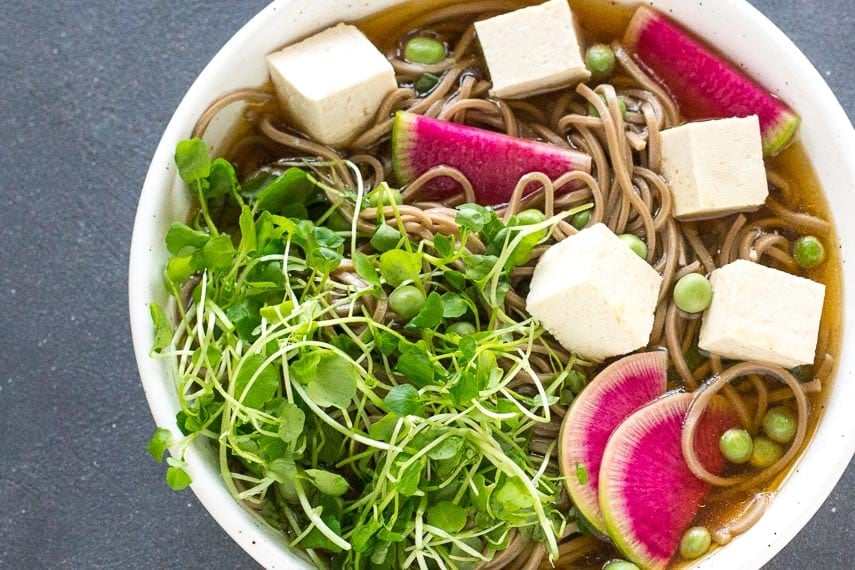
Let’s Talk Peas and FODMAPs
Peas have also been lab tested by Monash University in two forms: frozen/thawed and also canned. FODMAP Friendly has lab tested frozen/thawed as well.
Monash results for frozen/thawed are low FODMAP in portions of 1 Australian tablespoon or 15 g.
FODMAP Friendly results for frozen/thawed are “Fail” at ½ cup (75 g).
Monash results for canned (drained) peas are low FODMAP in portions of ¼ cup (45 g).
Unfortunately, no fresh peas have been lab tested.
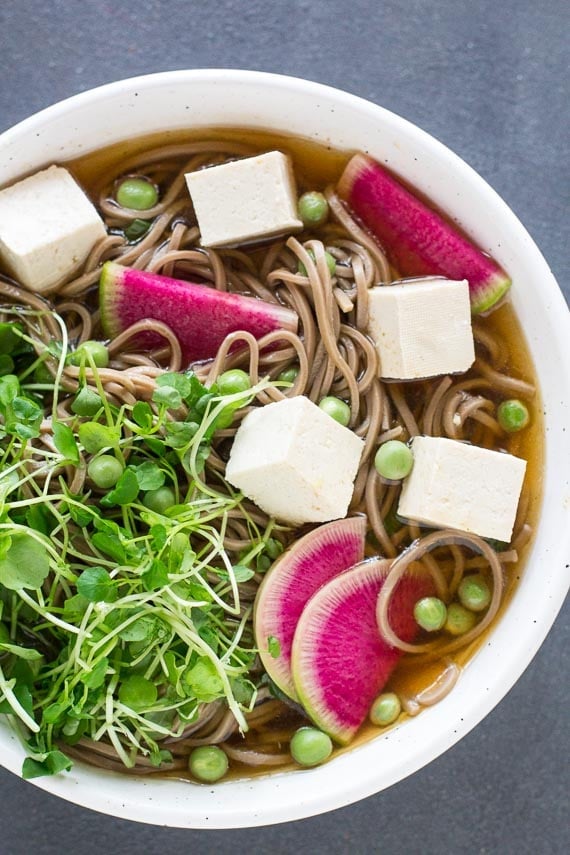
Daikon and Radishes
Did you see the amazing watermelon radishes in the main image? Because they are incredibly beautiful and inviting and I know that my family and I tolerate them well. Also, FODMAP Friendly lab tested watermelon radish and says they are low FODMAP at a 150g serve (about 3 medium watermelon radish).
White daikon, on the other hand, has been lab tested by Monash and they are low FODMAP in servings of ½ cup (75 g). Use those if you cannot find the watermelon type.
Red radishes have also been lab tested and have shown no FODMAP content, by the way and we have also seen Epicured, a low FODMAP prepared meal company, use watermelon radishes in some of their offerings. The choice is yours!
You can also read more about this crunchy vegetable in our Explore An Ingredient: Radishes.
Ingredients for Low FODMAP Cold Soba Soup
Once your ingredients are assembled, this soup comes together quickly. We highly recommend our homemade low FODMAP vegetable broth.
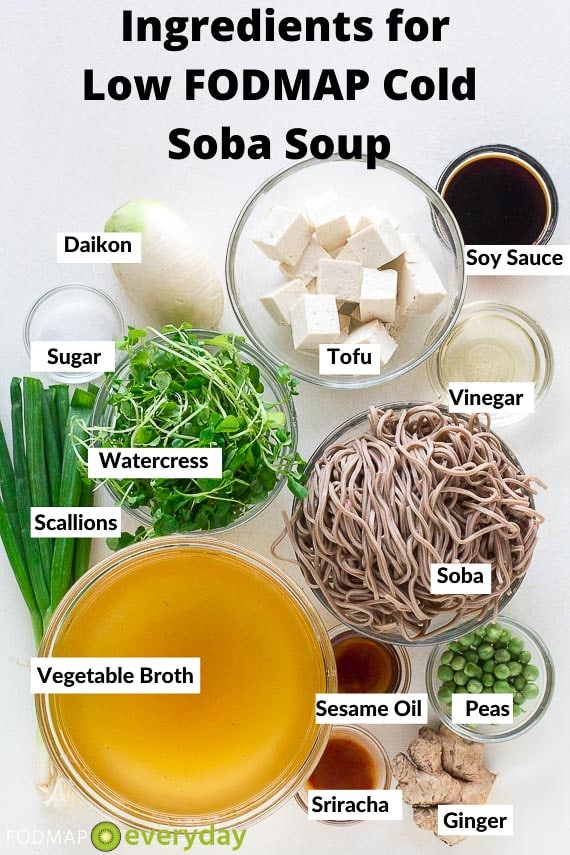
How To Make Low FODMAP Cold Soba Soup
Not all tofu is low FODMAP, but firm and extra-firm is. Since your desired end result is firm, cubed tofu, we like to start with extra-firm. Even so, take the time to press and drain as described.
While the tofu is draining you can cook the soba – and the peas at the same time, which saves time and pots and pans.
For Low FODMAP Vegetable Broth, there is nothing like homemade. If you must, you can use a prepared product.
Have all of your ingredients ready and assemble the bowls of soup right before serving.
And if you like the idea of cold soba dishes, try our Cold Soba Salad with Greens.
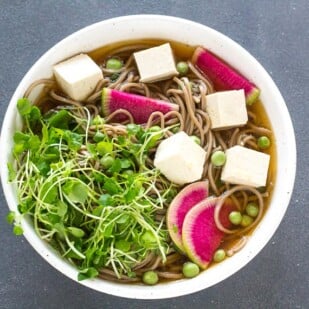
Low FODMAP Cold Soba Soup
Cold soba soup is a traditional soup and this Low FODMAP Cold Soba Soup is our LOFO take on it. We love this on a hot summer’s night, but it works beautifully for lunch as well. Even though soba are made from wheat flour and buckwheat flour, they have been lab tested and have a low FODMAP serving size, which is detailed in our article All About Asian Noodles & FODMAPs, which we suggest that you read.
Ingredients:
- 8- ounces (225 g) extra-firm tofu, drained
- 4- ounces (115 g) soba noodles
- ¼ cup (60 g) frozen, defrosted peas
- 3 cups (720 ml) Low FODMAP Vegetable Broth, chilled
- 3 tablespoons low-sodium gluten-free soy sauce
- 2 tablespoons rice vinegar
- 1 teaspoon toasted sesame oil
- 1 teaspoon sugar
- ½ teaspoon minced fresh ginger
- 2 cups (160 g) watercress
- 3- ounces (85 g) white daikon radish, peeled and thinly sliced crosswise, then cut crosswise
- 2 tablespoons minced scallions, green parts only
- Sriracha
Preparation:
-
Cut the tofu block in half lengthwise. Place a triple layer of paper towel on a cutting board, place tofu slabs on top, then cover them with another triple layer of towel. Put something heavy on top, like another cutting board with a heavy pot on top. Allow to sit for about 10 minutes. This technique will remove excess water from the tofu so that it will hold its shape in the salad. Once tofu has drained, discard paper towels and cut tofu into cubes and set aside.
-
While the tofu is draining, bring a large pot of salted water to a boil over high heat and cook the soba noodles until al dente. Throw the peas in the boiling water, cook for about 10 seconds more, then drain and rinse with cold water; the noodles and peas should be cold. Divide the noodles and peas into 4 soup bowls.
-
Whisk together the chilled broth, soy sauce, rice vinegar, sesame oil, sugar and ginger until sugar is dissolved. Pour over noodles. Garnish with tofu, watercress, radishes and scallions and serve immediately with Sriracha, which you can use to your tolerance.
Notes:
Tips
FODMAP Information
Our recipes are based on Monash University and FODMAP Friendly science.
- Daikon: This white radish has been lab tested by Monash and they are low FODMAP in servings of ½ cup (75 g)
- Ginger: Monash University has lab tested fresh ginger root and has determined it to be free of FODMAPs, making it one of our go-to no FODMAP foods.
- Sugar: Monash University and FODMAP Friendly have both lab tested white, granulated sugar. Monash states that a Green Light low FODMAP serving size of white sugar is ¼ cup (50 g). FODMAP Friendly simply states that they have tested 1 tablespoon and that it is low FODMAP. Regular granulated white sugar is sucrose, which is a disaccharide made up of equal parts glucose and fructose. Sucrose is broken down and absorbed efficiently in the small intestine.
- Watercress: Monash has lab tested watercress and it is low FODMAP in portions of 1 cup (80 g). No Moderate or High FODMAP levels are given.
Please always refer to the Monash University & FODMAP Friendly smartphone apps for the most up-to-date lab tested information. As always, your tolerance is what counts; please eat accordingly. The ultimate goal of the low FODMAP diet is to eat as broadly as possible, without triggering symptoms, for the healthiest microbiome.
Nutrition
All nutritional information is based on third-party calculations and should be considered estimates. Actual nutritional content will vary with brands used, measuring methods, portion sizes and more. For a more detailed explanation, please read our article Understanding The Nutrition Panel Within Our Recipes.
